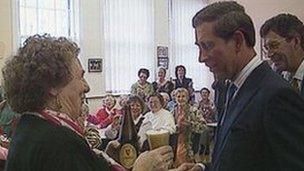Could the Queen's next step be a Dublin visit?
- Published
The Queen's 18th visit to Northern Ireland has fuelled speculation that her next trip to the island could be to the Irish Republic.
In spite of almost 60 years on the throne, the Queen has never crossed the UK border into Ireland.
Such a visit would epitomise the new era in Anglo-Irish relations, but the Sinn Fein president Gerry Adams has said he believes the time is not yet right.
"It's premature," he said.
"We still have a peace process which needs to deliver, and continue to a point where we as a people have reconciled, and have harmony.
"I'm saying none of this to be provocative to unionist sensitivities. But I am not a supporter of any monarchy. It's just a concept beyond me."
Speaking in west Belfast, he added: "This island is partitioned and despite all the advances that have been made, the English still claim sovereignty in this part of it, so I wouldn't make the English queen welcome at any point until that is resolved in any part of the island."
No visit has been announced yet, or arranged. However, it seems likely to happen towards the middle of next year.
This was signalled by the Irish prime minister Brian Cowen after a recent meeting with UK Prime Minister David Cameron at Downing Street.
He said: "Normal courtesies involving the exchange of state visits between heads of states is something that can and should happen, and I believe should happen during the tenure of our own president, who herself has been a bridge-builder for peace."

Princes Charles visited the Irish Republic in 1995.
Irish president Mary McAleese leaves office in a year's time, in the autumn of 2011, so the Dublin visit is expected to take place between now and then.
No British monarch has been to the city since Ireland gained independence. George V went in 1911 but, for much of the time since then, Anglo-Irish relations have been fraught.
Bottle
After the outbreak of the Troubles in Northern Ireland, demonstrators burned down the British Embassy in Dublin in 1972. Back then, the idea of the Queen visiting Ireland would have been unthinkable. However, the peace process has made the seemingly impossible become possible.
Who would have thought that the Rev Ian Paisley's party, the Democratic Unionists, would now be sharing power with Sinn Fein at Stormont, and that former IRA commander Martin McGuinness would be Northern Ireland's Deputy First Minister?
The image of the Queen in Dublin shaking hands with the Irish president would be a landmark moment in Anglo-Irish history. All the indications are that a majority of people, north and south of the border, would support such a visit.
There have been a number of protests by hardline republicans in Dublin about a possible royal visit, but the number of demonstrators has been tiny.
Dublin city councillor Aodhan O'Riordan believes there are economic and social reasons for welcoming the Queen to Ireland.
He said: "The fact that we have so many Irish living in Britain, and so many Irish who have had to emigrate to Britain, and so many Irish now who are going to be forced to emigrate again because of the recession here, means we should probably be more welcoming to the British head of state than anybody else."
The Irish historian Dr Eamon Phoenix says such a visit would amount to the "missing piece of the jigsaw" in the peace process, and mark the formal end of decades of diplomatic turbulence.
He said: "I think historians will see it as drawing a lot of the last poison out of the Anglo-Irish relationship."
Although the Queen has not been to Dublin, her son Prince Charles went in 1995.
At one engagement, a large group of women sang 'for he's a jolly good fellow' and poured him a bottle of Guinness.
It is likely that a visit by his mother would be a more sober occasion.